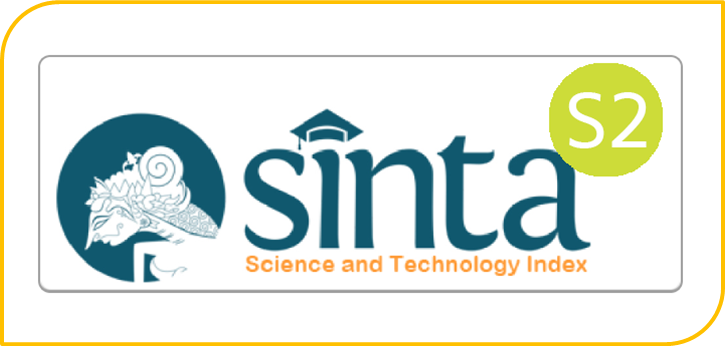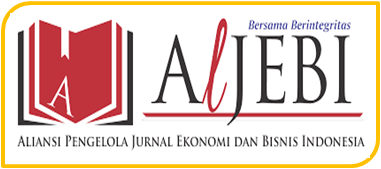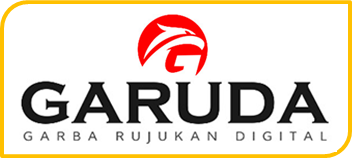DECENTRALIZED ISLAMIC FINANCE: HARNESSING BLOCKCHAIN TECHNOLOGY
Abstract
Keywords
Full Text:
PDFReferences
Abdeen, M., Jan, S., Khan, S., & Ali, T. (2019). Employing Takaful Islamic banking through state of the art blockchain: A case study. International Journal of Advanced Computer Science and Applications, 10(12), 648–654. https://doi.org/10.14569/ijacsa.2019.0101283
Abojeib, M., & Habib, F. (2021). Blockchain for Islamic social responsibility institutions. Research Anthology on Blockchain Technology in Business, Healthcare, Education, and Government. 1114-1128
https://api.semanticscholar.org/CorpusID:159680571
Alaeddin, O., Dakash, M. Al, & Azrak, T. (2021). Implementing the blockchain technology in Islamic financial industry: Opportunities and challenges. Journal of Information Technology Management, 13(3), 99–115. https://doi.org/10.22059/JITM.2021.83116
Alfarisi, M. F., Agestayani, A., & Delfiani, S. (2020). The impact of Islamic economics and finance courses on Islamic financial literacy. Iqtishadia, 13(2), 197. https://doi.org/10.21043/iqtishadia.v13i2.7757
Antova, I., & Tayachi, T. (2020). Blockchain and smart contracts: A risk management tool for Islamic finance. Journal of Islamic Financial Studies, 05(01), 29–42. https://doi.org/10.12785/jifs/050103
Aydar, M., & Ayvaz, S. (2019). Towards a blockchain based digital identity verification, record attestation and record sharing system. ArXiv, abs/1906.0. https://api.semanticscholar.org/CorpusID:195345355
Ayub, M., Hassan, M. K., & Saba, I. (2023). Revisiting the paradigm of Sharīʿah governance of Islamic financial institutions. Journal of Islamic Accounting and Business Research. Vol. ahead-of-print No. ahead-of-print
https://doi.org/10.1108/JIABR-04-2022-0110
Azimov, D. (2021). Analysis of the international experience of implementing blockchain technology. Access to science, business, innovation in digital economy, ACCESS Press, 2(2): 138-149.
https://doi.org/10.46656/access.2021.2.2(2)
Bakar, R. A, Abd Aziz, N., & Rosley, R. Z. (2022). Awareness of gharar in sale and purchase contracts among Kuala Nerus Society. Journal of Islamic, Social, Economics and Development, 7(43), 29–39.
https://doi.org/10.55573/jised.074303
Bakar, A. Y. S., Nafees, S. M., Dorloh, S., & Aji, R. H. (2023). The concept of sukuk and its applications in contemporary Islamic financial system. Law and Humanities Quarterly Reviews. 39-54
https://doi.org/10.31014/aior.1996.02.03.70
Bakti, F. P., Achmad, & Rifai, A. (2022). Analysis of the characteristics of financial risk in contract with the principle of profit-sharing in sharia banking. Awang Long Law Review, 5(1), 19-28. https://doi.org/10.56301/awl.v5i1.530
Batorshyna, A., Tokar, V., Kolinets, L., Sybyrka, L., & Almarashdi, O. (2021). The interplay between the global Islamic finance and economic growth of Muslim countries. Financial and Credit Activity: Problems of Theory and Practice. https://doi.org/10.18371/fcaptp.v3i38.237452
Bhattacharjee, A., Badsha, S., Shahid, A. R., Livani, H., & Sengupta, S. (2020). Block-Phasor: A Decentralized blockchain framework to enhance security of Synchrophasor. 2020 IEEE Kansas Power and Energy Conference (KPEC), 1–6.
https://doi.org/10.1109/KPEC47870.2020.9167676
Biancone, P. P., & Radwan, M. (2019). Social finance and financing social enterprises. EJIF : European Journal of Islamic Finance, 50–61. https://doi.org/10.13135/2421-2172/3176
Biswas, S., Sharif, K., Li, F., Nour, B., & Wang, Y. (2019). A scalable blockchain framework for secure transactions in IoT. IEEE Internet of Things Journal, 6(3), 4650–4659. https://doi.org/10.1109/JIOT.2018.2874095
Budiyanti, N., Kosasih, A., & Az-Zahra, S. A. (2021). Sharia Investment in Islamic Economic Principles. FITRAH: Jurnal Kajian Ilmu-ilmu Keislaman, 7(1), 119-132. doi:https://doi.org/10.24952/fitrah.v7i1.3679
Cao, S., William Cong, L., & Yang, B. (2019). Financial reporting and blockchains: Audit pricing, misstatements, and regulation. Regulation of Financial Institutions ,7. http://dx.doi.org/10.2139/ssrn.3248002
Chohan, U. W. (2021). Decentralized Finance (DeFi): An emergent alternative financial architecture. Econometric Modeling: International Financial Markets - Foreign Exchange EJournal.
http://dx.doi.org/10.2139/ssrn.3791921
Chong, F. H. L. (2021). Enhancing trust through digital Islamic finance and blockchain technology. Qualitative Research in Financial Markets, 13(3), 328–341. https://doi.org/10.1108/QRFM-05-2020-0076
Dahdal, A., Truby, J., & Ismailov, O. (2022). The role and potential of blockchain technology in Islamic finance. European Business Law Review, 33(2),175–192. https://doi.org/10.54648/eulr2022005
Dawood, H. M., Zadjali, D. F. Al, Rawahi, M. Al, Karim, D. S., & Hazik, D. M. (2022). Business trends & challenges in Islamic FinTech: A systematic literature review. F1000Research, 11, 329.
https://doi.org/10.12688/f1000research.109400.1
Dos Santos, S., Singh, J., Thulasiram, R. K., Kamali, S., Sirico, L., & Loud, L. (2022). A new era of blockchain-powered Decentralized Finance (DeFi) - A Review. 2022 IEEE 46th Annual Computers, Software, and Applications Conference (COMPSAC), 1286–1292.
https://doi.org/10.1109/COMPSAC54236.2022.00203
Dubey, R., Gunasekaran, A., Bryde, D. J., Dwivedi, Y. K., & Papadopoulos, T. (2020). Blockchain technology for enhancing swift-trust, collaboration and resilience within a humanitarian supply chain setting. International Journal of Production Research, 58(11), 3381–3398.
https://doi.org/10.1080/00207543.2020.1722860
Elasrag, H. (2019). Blockchains for Islamic finance: Obstacles & challenges. Munich Personal RePEc Archive, 03, 1–39. https://mpra.ub.uni-muenchen.de/92676/
Farikhin, A., & Mulyasari, H. (2022). Gharar, Fraud and Dispute in Islamic Business Transaction an Islamic Law Perspectives. International Economic and Finance Review, 1(2), 40–53.
https://doi.org/10.56897/iefr.v1i2.18
Gaikwad, A. S. (2020). Overview of blockchain. International Journal for Research in Applied Science and Engineering Technology, 8(6), 2268–2270. https://doi.org/10.22214/ijraset.2020.6364
Hamza, O. (2020). Smart sukuk structure from sharia perspective and financing benefits: Proposed application of smart sukuk through blockchain technology in Islamic banks within Turkey. EJIF – European Journal of Islamic Finance, Second Special Issue, 1–8.
https://www.ojs.unito.it/index.php/EJIF/article/view/3983
Harahap, B., & Risfandy, T. (2022). Islamic organization and the perception of riba (Usury) and conventional banks among Muslims: Evidence From Indonesia. SAGE Open, 12(2).
https://doi.org/10.1177/21582440221097931
Hari, G. S. (2023). Data extraction from Decentralized Finance (DeFi). International Journal of Scientific and Research Publications, 13(9), http://dx.doi.org/10.29322/IJSRP.13.09.2023.p14106
Hassan, A., AlMaghaireh, A. I., & Islam, M. S. (2022). Islamic financial markets and institutions. Islamic Financial Markets and Institutions. https://doi.org/10.4324/9780429321207
Hassan, M. K., Aliyu, S., Huda, M., & Rashid, M. (2019). A survey on Islamic Finance and accounting standards. Borsa Istanbul Review, 19(1). https://doi.org/10.1016/j.bir.2019.07.006
Hilal, F. B., Faridah, N., & Jamaludin, B. (2019). Contemporary management and science issues in the halal industry. In Contemporary Management and Science Issues in the Halal Industry. Springer Singapore. https://doi.org/10.1007/978-981-13-2677-6
Ibrahim, M. H. (2019). Capital regulation and Islamic banking performance: Panel evidence. Buletin Ekonomi Moneter Dan Perbankan, 22(1), 47–67. https://doi.org/10.21098/bemp.v22i1.1029
Iftekhar, A., Cui, X., & Yang, Y. (2021). Blockchain technology for trustworthy operations in the management of strategic grain reserves. Foods, 10(10). https://doi.org/10.3390/foods10102323
Inzirillo, H., & de Quenetain, S. (2022). Managing risk in DeFi Portfolios. SSRN Electronic Journal. http://dx.doi.org/10.2139/ssrn.4228899
Ishak, M. A. F., Ramli, J., & Ahmad, H. H. (2023). Maneuvering the application of Musharakah Contract on venture capital. International Journal of Academic Research in Business and Social Sciences. http://dx.doi.org/10.6007/IJARBSS/v13-i10/18912
Jiang, E., Qin, B., Wang, Q., Wang, Z., Wu, Q., Weng, J., Li, X., Wang, C., Ding, Y., & Zhang, Y. (2023). Decentralized Finance (DeFi): A survey. IACR Cryptol. EPrint Arch., 2023, 1210. https://doi.org/10.48550/arXiv.2308.05282
Kamdzhalov, M. (2020). Islamic finance and the new technology challenges. European Journal of Islamic Finance, May 2020, 1–5. http://ezproxy.lib.swin.edu.au/login?url=http://search.ebscohost.com/login.aspx?direct=true&db=bth&AN=142574990&site=ehost-live&scope=site
Kanwal, A. (2022). The prohibition of speculation in Islamic finance: fairness and framing. International Journal of Islamic and Middle Eastern Finance and Management, 15(1), 146–157. https://doi.org/10.1108/IMEFM-01-2021-0034
Khurshid, A. (2020). Applying blockchain technology to address the crisis of trust during the COVID-19 pandemic. JMIR Medical Informatics, 8(9), 1–9. https://doi.org/10.2196/20477
Krytsula, A. A. (2022). Legal regulation of smart сontracts. Rossijskoe Pravosudie. https://doi.org/10.1055/s-0037-1616066
Kuznetsova, A., & Tenberga, I. (2022). Purchase and sale and prohibition of uncertainty (gharar) in the Islamic tradition. Pravovedenie. https://doi.org/10.21638/spbu25.2022.203
Kwon, S. (2023). Regulation of DeFi Lending. Science and Technology Law Review. https://doi.org/10.52214/stlr.v24i2.11629
Li, S., Zhao, S., Yang, P., Andriotis, P., Xu, L., & Sun, Q. (2019). Distributed consensus algorithm for events detection in cyber-physical systems. IEEE Internet of Things Journal, 6(2), 2299–2308. https://doi.org/10.1109/JIOT.2019.2906157
Liu, B., Xiao, L., Long, J., Tang, M., & Hosam, O. (2020). Secure digital certificate-based data access control scheme in blockchain. IEEE Access, 8, 91751–91760. https://doi.org/10.1109/ACCESS.2020.2993921
Majumdar, S., & Gochhait, S. (2022). Risks and solutions in Islamic decentralised finance. 2022 International Conference on Sustainable Islamic Business and Finance (SIBF), 159–163.
https://doi.org/10.1109/SIBF56821.2022.9939821
Mitrev, D. (2023). Ecological impact on digitalization in insurance and insurance intermediation. 10th SWS International Scientific Conferences on SOCIAL SCIENCES - ISCSS Proceedings 2023.
https://doi.org/10.35603/sws.iscss.2023/s13.55
Monzur-E-Elahi, M., & Alam, M. M. (2022). Application of Maqasid Al-Shariah and rules of shariah in managing wealth and financial transactions. https://doi.org/10.31219/osf.io/ueavm
Moosavi, J., Naeni, L. M., Fathollahi-Fard, A. M., & Fiore, U. (2021). Blockchain in supply chain management: A review, bibliometric, and network analysis. Environmental Science and Pollution Research. https://doi.org/10.1007/s11356-021-13094-3
Muhammad, R., & Lanaula, R. (2019). Challenges of Islamic supervisory in the islamic financial technology industry. Economica: Jurnal Ekonomi Islam. https://doi.org/10.21580/economica.2019.10.2.3400
Muneeza, A., & Mustapha, Z. (2019). Halal cryptocurrency management. In Halal Cryptocurrency Management. Springer International Publishing. https://doi.org/10.1007/978-3-030-10749-9
Muryanto, Y. T. (2022). The urgency of sharia compliance regulations for Islamic Fintechs: a comparative study of Indonesia, Malaysia and the United Kingdom. Journal of Financial Crime.
https://doi.org/10.1108/jfc-05-2022-0099
Musjtari, D. N., & Kencana, S. W. (2020). Legal relations and legal consequences of Wakālah contract implementation in Hajj Fund Deposit. https://doi.org/10.26555/novelty.v11i2.a16979
Naim, A. M., Isa, M. Y., & Hamid, M. L. (2020). Islamic finance: Legal frameworks, practices and shariah criteria review (UUM Press). Penerbit Universiti Utara Malaysia.
https://books.google.com.my/books?id=jdAOEAAAQBAJ
Nikolić, L. (2023). Challenges of digitalization of financial transactions. Zbornik Radova Pravnog Fakulteta Nis.
https://doi.org/10.5937/zrpfn1-44231
Osman, M., & Elamin, I. (2023). Advancing ethical and sustainable economy: Islamic finance solutions for environmental, social, & economic challenges in the digital age. International Journal, 10(5), 408-429. https://doi.org/10.15379/ijmst.v10i5.2515
Otoritas Jasa Keuangan. (2022). Laporan perkembangan keuangan syariah 2022. Lap Perkembangan Keuangan Syariah Indonesia, 1–184. https://ojk.go.id/id/kanal/syariah/data-dan-statistik/laporan-perkembangan-keuangan-syariah-indonesia/Pages/Laporan-Perkembangan-Keuangan-Syariah-Indonesia-2022.aspx
Popescu, A. D. (2022). Understanding FinTech and Decentralized Finance (DeFi) for financial inclusion. FinTech Development for Financial Inclusiveness. https://doi.org/10.4018/978-1-7998-8447-7.ch001
Qin, K., Zhou, L., Afonin, Y., Lazzaretti, L., & Gervais, A. (2021). CeFi vs. DeFi - Comparing Centralized to Decentralized Finance. ArXiv, abs/2106.08157. https://api.semanticscholar.org/CorpusID:235435858
Rabbani, M. R., Khan, S., & Thalassinos, E. I. (2020). FinTech, blockchain and Islamic finance: An extensive literature review. International Journal of Economics and Business Administration.
https://doi.org/10.35808/ersj/1560
Rachmawaty, R., Pandaya, K. D., & Mohammed Al Azab, A. J. (2019). The implementation of Wakalah contract by multifinance companies in Indonesia. International Journal of Islamic Economics, 1(01), 79. https://doi.org/10.32332/ijie.v1i01.1577
Salami, I. (2021). Challenges and approaches to regulating decentralized finance. AJIL Unbound, 115, 425–429.
https://doi.org/10.1017/aju.2021.66
Schueffel, P. E. (2021). DeFi: Decentralized Finance - An introduction and overview. Journal of Innovation Management.
https://doi.org/10.24840/2183-0606_009.003_0001
Shinkafi, A. A., Yahaya, S., & Sani, T. A. (2020). Realising financial inclusion in Islamic finance. Journal of Islamic Marketing, 11(1), 143–160. https://doi.org/10.1108/JIMA-02-2017-0020
Simanjuntak, D. A., Safitri, K., Rahayu, D. R., Nainggolan, N. S., & Amelia, R. (2023). Islamic law perspective on investment. Cashflow : Current Advanced Research On Sharia Finance And Economic Worldwide. https://doi.org/10.55047/cashflow.v2i3.644
Song, H., & Chen, Y. (2021). Digital financial transaction security based on blockchain technology. Journal of Physics: Conference Series, 1744(3). https://doi.org/10.1088/1742-6596/1744/3/032029
Tariq, A., Haq, H. B., & Ali, S. T. (2019). Cerberus: A blockchain-based accreditation and degree verification system. IEEE Transactions on Computational Social Systems, 10, 1503–1514.
https://doi.org/10.1109/TCSS.2022.3188453
Wang, B., Dabbaghjamanesh, M., Kavousi-Fard, A., & Mehraeen, S. (2019). Cybersecurity enhancement of power trading within the networked microgrids based on blockchain and directed acyclic graph approach. IEEE Transactions on Industry Applications, 55(6), 7300–7309. https://doi.org/10.1109/TIA.2019.2919820
Weingärtner, T., Fasser, F., da Costa, P. R. S., & Farkas, W. (2023). Deciphering DeFi: A comprehensive analysis and visualization of risks in decentralized finance. Journal of Risk and Financial Management. https://doi.org/10.3390/jrfm16100454
Williams, V., Boylan, A. M., & Nunan, D. (2020). Critical appraisal of qualitative research: Necessity, partialities and the issue of bias. BMJ Evidence-Based Medicine, 25(1), 9–11. https://doi.org/10.1136/bmjebm-2018-111132
www.asad-institute.co.id. Accessed on 2024, avalaible https://asad-institute.co.id/learn/blockchain-untuk-keuangan-syariah
Yadav, S. P., Agrawal, K. K., Bhati, B. S., Al-Turjman, F., & Mostarda, L. (2022). Blockchain-based cryptocurrency regulation: An overview. Computational Economics, 59(4), 1659–1675.
https://doi.org/10.1007/s10614-020-10050-0
Zetzsche, D. A., Arner, D. W., & Buckley, R. P. (2020). Decentralized finance. Journal of Financial Regulation, 6(2), 172–203. https://doi.org/10.1093/jfr/fjaa010
Zhai, S., Yang, Y., Li, J., Qiu, C., & Zhao, J. (2019). Research on the application of cryptography on the blockchain. Journal of Physics: Conference Series, 1168(3). https://doi.org/10.1088/1742-6596/1168/3/032077
DOI: https://doi.org/10.18860/ed.v12i1.23333
Refbacks
- There are currently no refbacks.
Editorial Office:
Megawati Soekarnoputri Building
Faculty of Economics
E-mail: eldinar@uin-malang.ac.id
Universitas Islam Negeri Maulana Malik Ibrahim Malang
E-ISSN 2622-0083

El Dinar under a CC BY SA 4.0 International License.
Member of:
Indexed By:

















